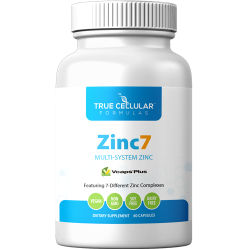In a world brimming with health challenges, fortifying our immune system is more crucial than ever. Among the array of nutrients essential for health, zinc emerges as a standout – a veritable commander of our immune defenses. This article delves into the profound impact of zinc on our immune system, unraveling how the power of zinc, this mighty mineral, can be a game-changer in our quest for optimal health.
What is Zinc?[1]
Zinc is a trace element, meaning our bodies need it in small but essential amounts. It’s found naturally in various foods, from meats and seafood to nuts and seeds. However, despite its widespread availability, zinc deficiencies are not uncommon, leading many to turn to supplements for an extra health boost.
Zinc and Immune Function: A Dynamic Duo
The connection between zinc and the immune system is both intricate and vital. Here’s how zinc plays a pivotal role in keeping our immune system robust:
- Immune Cell Regulation: Zinc is crucial for the growth and function of immune cells like T-lymphocytes and natural killer cells. It modulates how these cells respond to threats, ensuring a balanced immune response.[2]
- Antioxidant Protection: Zinc acts as an antioxidant, helping to combat oxidative stress caused by free radicals, which can otherwise weaken the immune system.[3]
- Barrier Function: It strengthens the skin and mucous membranes’ barrier function as a frontline defense against pathogens.[4]
- Inflammation Modulation: Zinc helps control inflammation, ensuring that the immune response is effective yet not excessively aggressive, which can lead to tissue damage.[5]
Beyond Immunity: The Widespread Roles of Zinc[1]
Zinc’s benefits extend far beyond immunity:
- Wound Healing: It plays a crucial role in maintaining skin integrity and is essential in healing cuts and bruises.
- DNA Synthesis and Cell Division: Zinc is key for these fundamental biological processes, essential for growth and development.
- Sense of Taste and Smell: Adequate zinc levels are necessary for these senses to function correctly.
The Signs of Zinc Deficiency[6]
Zinc deficiency can manifest in various ways, including weakened immune response, delayed wound healing, hair loss, and changes in taste and smell. Those at risk include vegetarians, pregnant and lactating women, and individuals with digestive disorders.
How Much Zinc Do You Need?[1]
The recommended dietary allowance (RDA) for zinc varies by age, sex, and life stage:
- Adult Men: 11 mg/day
- Adult Women: 8 mg/day
- Pregnant Women: 11-12 mg/day
- Lactating Women: 12-13 mg/day
Best Dietary Sources of Zinc[7]
To boost your zinc intake, consider these foods:
- Red meat and poultry
- Seafood (especially oysters)
- Beans, nuts, and seeds
Zinc Supplements: Things to Consider
While supplements can help fill the nutritional gaps, they should be approached with caution:
- Dosage: Excessive zinc can inhibit copper absorption and lead to gastrointestinal upset.
- Form: Zinc is available in various forms, such as zinc gluconate, zinc sulfate, and zinc acetate, each with different absorption rates.
- Interaction with Medications: Zinc can interact with certain drugs, including antibiotics and diuretics.
Zinc7
The rediscovery of the power of Zinc is one of the most important breakthroughs in the history of modern nutrition. 
Because research—REAL HUMAN RESEARCH—has already shown it can:
- Significantly boost immunity (knowing you’re better protected)
- Help you fall asleep faster and stay asleep (wake up refreshed)
- Lose weight faster on the same amount of calories (a must-have for healthy metabolism)
- Boost hormone health, sex drive, and performance (both men and women!)
- Protect your liver against carcinogens and toxins (keep “fatty liver” away)
- And even transform your gums and teeth (stop bleeding, decay, and keep them whiter)
Zinc7 is a revolutionary way to get all of the Zinc your body needs in just seconds each morning.
Just take 2-3 capsules each morning or evening, whichever you prefer — or more if lab tests show you’re deficient… and you’ll have everything you need to keep your immunity strong, your sleep deep, your metabolism high, and teeth white and strong.
Zinc7 includes:
- Zinc Citrate – for gums, teeth, and dental health.
- Zinc Glycinate – for hormones and sex drive
- Zinc Picolinate – for liver cell health and anti-aging
- Zinc Ascorbate – for colds and immune system protection
- Zinc Methionate – higher absorption and synergy
- Zinc Orotate – for deeper, high-quality sleep
- Zinc Acetate – faster recovery from infection
- Rose Hips – ultimate cellular delivery nutrients for Zinc
Conclusion
Zinc’s formidable role in supporting immune function and overall health is undeniable. By maintaining a balanced diet rich in zinc and considering supplementation if necessary, we can harness this powerful mineral’s full potential.
Remember, the key to reaping zinc’s benefits while avoiding its pitfalls lies in balance and moderation. Prioritize a well-rounded diet, consult with healthcare providers when considering supplements, and gear up to give your immune system the well-deserved boost it needs with the incredible power of zinc!
References:
- David Rabinovich; Yamen Smadi.https://www.ncbi.nlm.nih.gov/books/NBK547698/#:~:text=Zinc%20is%20a%20medication%20used,zinc%20as%20a%20valuable%20agent.
- Inga Wessels, Martina Maywald, and Lothar Rink.Zinc as a Gatekeeper of Immune Function.017 Dec; 9(12): 1286.doi: 10.3390/nu9121286.PMCID: PMC5748737.PMID: 29186856.
- Dilina do Nascimento Marreiro, Kyria Jayanne Clímaco Cruz, Jennifer Beatriz Silva Morais, Jéssica Batista Beserra, Juliana Soares Severo, and Ana Raquel Soares de Oliveira.Zinc and Oxidative Stress: Current Mechanisms.2017 Jun; 6(2): 24.Mar 29. doi: 10.3390/antiox6020024.PMCID: PMC5488004.PMID: 28353636.
- Gergő Kalló, Ajneesh Kumar,József Tőzsér,and Éva Csősz.Chemical Barrier Proteins in Human Body Fluids.022 Jul; 10(7): 1472.doi: 10.3390/biomedicines10071472.PMCID: PMC9312486.PMID: 35884778.
- Nour Zahi Gammoh and Lothar Rink.Zinc in Infection and Inflammation.2017 Jun; 9(6): 624. doi: 10.3390/nu9060624.PMCID: PMC5490603.PMID: 28629136.
- Luke Maxfield; Samarth Shukla; Jonathan S. Crane.Zinc Deficiency.https://www.ncbi.nlm.nih.gov/books/NBK493231/#:~:text=47%5D%5B52%5D-,Diarrhea,for%20diabetes%20mellitus%20and%20obesity.
- Zinc.https://ods.od.nih.gov/factsheets/Zinc-HealthProfessional/


